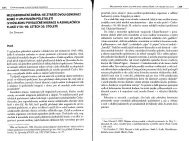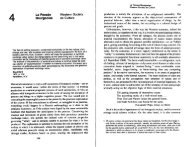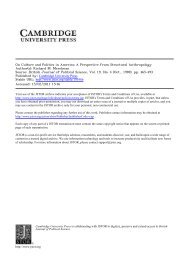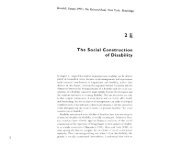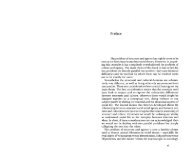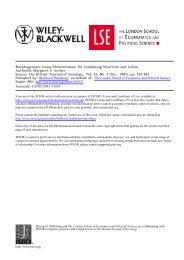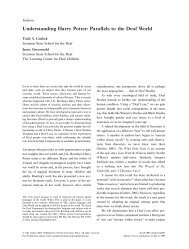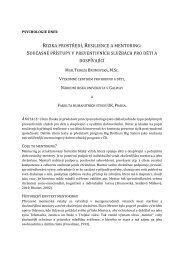Culture and Practical Reason Two Paradigms of ... - Moodle
Culture and Practical Reason Two Paradigms of ... - Moodle
Culture and Practical Reason Two Paradigms of ... - Moodle
- No tags were found...
Create successful ePaper yourself
Turn your PDF publications into a flip-book with our unique Google optimized e-Paper software.
Chapter <strong>Two</strong> 56 <strong>Culture</strong> <strong>and</strong> <strong>Practical</strong> <strong>Reason</strong><strong>Two</strong> <strong>Paradigms</strong> <strong>of</strong> Anthropological Theory57meaningful one in the "conceptual scheme." In the first case, culture is aninstrumental system, in the second the instrumental is subject to systems <strong>of</strong>another kind.The relevance <strong>of</strong> this parochial controversy to Marx's invocation <strong>of</strong>praxis is patent-although, as we shall see, Marx's position cannot besimply assimilated to the received empirico-materialism in anthropology.Still, it is by a moderate distinction from Marxism, "if not Marx himself,"that Levi-Strauss most succinctly states his own perspective:If, as I have said, the conceptual scheme governs <strong>and</strong> defines practices,it is because these, which the ethnologist studies as discreterealities placed in time <strong>and</strong> space <strong>and</strong> distinctive in their particularmodes <strong>of</strong> life <strong>and</strong> forms <strong>of</strong> civilization, are not to be confused withpraxis which-<strong>and</strong> here at least I agree with Sartre-constitutes thefundamental totality for the sciences <strong>of</strong> man. Marxism, if not Marxhimself, has too commonly reasoned as though practices followed directlyfrom praxis. Without questioning the undoubted primacy <strong>of</strong> infrastructures,I believe that there is always a mediator between praxis<strong>and</strong> practices, namely the conceptual scheme by the operation <strong>of</strong>which matter <strong>and</strong> form, neither with any independent existence, arerealized as structures, that is as entities which are both empirical <strong>and</strong>intelligible. [1966, pp. 130-31]Levi-Strauss goes on to explicate the contrast, as if it were a matter <strong>of</strong>complementary pursuits:It is to this theory <strong>of</strong> superstructures, scarcely touched on by Marx,that I hope to make a contribution. The development <strong>of</strong> the study <strong>of</strong>infrastructures proper is a task which must be left to history-with theaid <strong>of</strong> demography, technology, historical geography <strong>and</strong> ethnography.It is not principally the ethnologist's concern, for ethnology isfirst <strong>of</strong> all psychology. [Ibid.]The seriousness <strong>of</strong> Levi-Strauss's criticism seems only disguised by thismodest disclaimer. And perhaps he concedes too much <strong>of</strong> his science. Ifthe conceptual scheme encompasses matter in the terms <strong>of</strong> a human existence,still it does not come upon the scene <strong>of</strong> practical action merely toadd the appropriate interpretation <strong>of</strong> material facts or instrumental relations.Nor would the decoding <strong>of</strong> the scheme be confined to "superstructure." This scheme is the very organization <strong>of</strong> material production; analyzingit, we are in the economic base itself. Its presence there dissolves theclassic antinomies <strong>of</strong> infrastructure <strong>and</strong> superstructure, the one considered"material" the other "conceptual." Of course, it does not dissolve the"material" as such. But the so-called material causes must be, in thatcapacity, the product <strong>of</strong> a symbolic system whose character it is our task toinvestigate; for without the mediation <strong>of</strong> this cultural scheme, no adequaterelation between a given material condition <strong>and</strong> a specific cultural form canever be specified. The general determinations <strong>of</strong> praxis are subject to thespecific formulations <strong>of</strong> culture; that is, <strong>of</strong> an order that enjoys, by its ownproperties as a symbolic system, a fundamental autonomy.MorganThe issues involved in the option between the practical <strong>and</strong> meaningfullogics have been fought, as I say, on a dozen battlegrounds over a hundredyears <strong>of</strong> anthropological war. A reflection on that history will go a longway toward clarifying them. But I must warn that the excursion will be ahistory "for us"-a way <strong>of</strong> taking consciousness <strong>of</strong> ourselves inhistory-without any pretension to the status <strong>of</strong> a "true" diachronic account.Thus I set up the contrasts between Lewis Henry Morgan <strong>and</strong> FranzBoas as a paradigmatic opposition, without reference to other figures <strong>of</strong> theintellectual context <strong>and</strong> background whose influences were surely criticalto the controversy thus personified. Again, I leave aside or consider summarilymany serious thinkers <strong>of</strong> later times, both in anthropology <strong>and</strong> inkindred disciplines, whom others might justifiably consider more important<strong>and</strong> exemplary. Perhaps such cavalier treatment may be excused bylikening it to a history with which anthropologists have become familiar: aversion <strong>of</strong> the past as it is actually lived by one segment <strong>of</strong> the society, asthe charter <strong>of</strong> its present condition (see Pouillon 1975).I begin with Morgan-<strong>and</strong> with the further qualification that the choiceis in some measure equivocal. As with every founding father, Morgan'sthought tends to be more generalized than the views that have differentiatedfrom it, containing within itself the "germs" <strong>of</strong> almost every succeedingposition. This means the man may be submitted to many theoreticalreadings, anyone <strong>of</strong> which, precisely as it becomes a charter <strong>of</strong> presentcontention, may be guilty <strong>of</strong> less than adequate respect for the originalgenerality. So Morgan has been categorized by later scholarship as an"idealist" for his emphasis on the unfolding <strong>of</strong> original "germs <strong>of</strong>thought"; as a "materialist" for his grounding <strong>of</strong> social evolution ondevelopments in the arts <strong>of</strong> subsistence; <strong>and</strong> then again, as a "philosophicaldualist" for his simultaneous dependence on both. An allusion to the"natural logic <strong>of</strong> the mind" has led some to consider him a "mentalist,"while others hold him guilty <strong>of</strong> "racism" for referring culture to the



